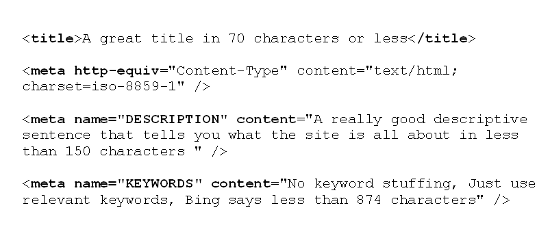Best Practice SEO dictates that you need good meta information as it is essential for SEO. Two tags to focus on are title tags and meta descriptions. Make sure they are descriptive and most importantly, relevant to the content on the website.
If you do have duplicate meta descriptions on your website, you will most likely get a warning in Google Webmaster Tools. Take this as a gentle nudge towards getting into the good habit of having a unique description for each page. After all, this is the summary snippet underneath your link on the search engine results page. The rule of thumb is to keep these under 150 characters in order to have the full sentence visible on the SERP. Sometimes you will notice that the description shown in Google SERPs are different from their meta description. This is because Google has cleverly shown you a snippet from the relevant content on your website if your meta description does not exist or is not “useful” enough. Most of the time, this looks a bit disjointed, so I’d recommend creating a quality description that will tempt searchers to click on your website.
Sometimes you will notice that the description shown in Google SERPs are different from their meta description. This is because Google has cleverly shown you a snippet from the relevant content on your website if your meta description does not exist or is not “useful” enough. Most of the time, this looks a bit disjointed, so I’d recommend creating a quality description that will tempt searchers to click on your website.
 As to the importance of meta keywords, it is also good practice to include it when creating meta information. This Google post says that they pretty much ignore the keyword meta tag. However there is still talk of Yahoo using Keywords as a ranking factor, despite a representative saying they don’t. What they do agree on is that meta keywords are used as a last resort when there are no other ranking signals to use. It would also seem that Bing is also encouraging users to create a descriptive meta keyword tag, using no more than 874 characters and not repeating keywords more than 4 times.
As to the importance of meta keywords, it is also good practice to include it when creating meta information. This Google post says that they pretty much ignore the keyword meta tag. However there is still talk of Yahoo using Keywords as a ranking factor, despite a representative saying they don’t. What they do agree on is that meta keywords are used as a last resort when there are no other ranking signals to use. It would also seem that Bing is also encouraging users to create a descriptive meta keyword tag, using no more than 874 characters and not repeating keywords more than 4 times.
There is one tag that we come across in some websites - the <meta name=”revisit-after” content=”x days”>. Although this may seem like a great tag to use, it is ignored by all major search engines holds no SEO value whatsoever.

I also ensure that my page url, title and meta description all contain the same keyword as often as I can because I find that helps to ensure every page has its own unique description.
Meta tags play a huge role. These dictate which niche you want your site to be searched for. In any case, you may want your meta tags to have high ranking keywords with less competition if you’re lucky to find one.
Hi all, thanks for all your comments.
@Diane - Just make sure you are not keyword stuffing, then you will be on the right track to achieving a well optimised page!
@Sergio - Definitely, finding the right balance between a highly searched keyword with relatively low competition is a fine art - capitalise on your niche when you have found one.
When keyword stuffing is put on the table, I can’t help thinking of those who try blacking hat SEO their way to high rankings. The most irritating is stuffing keywords on articles. The funny thing is, submission sites tend to approve these kinds of articles, by far is purely white hat SEO. Some from the web community have declined clients that are seeking the use of black hat methods, and that’s the way it should be.
@Sergio and Monica - You’re both spotted on about keyword research. Although this will really involve a huge amount of meticulous research, the payback after this is truly worth it.